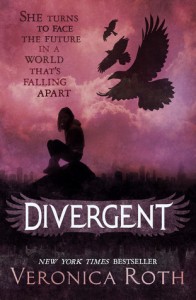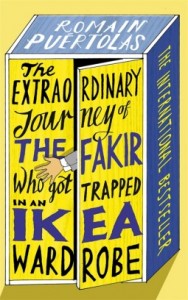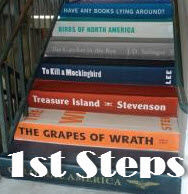 Title: Divergent (Goodreads)
Title: Divergent (Goodreads)
Author: Veronica Roth
Series: Divergent #1
Published: Harper Collins, 2011
Pages: 489
Genres: Dystopia, Young Adult
My Copy: Library Book
Buy: Amazon, Book Depository, Kindle (or visit your local Indie bookstore)
A futuristic, post-apocalyptic Chicago is where the dystopian world of Divergent is set; where everyone is divided into five factions. At 16 you are required to take an aptitude test; this will determine which faction you are best suited for. Abnegation are selfless, Amity are peaceful, Candour are honest, Dauntless are brave and Erudite are intelligent. Following the aptitude test comes the Choosing Day (terrible name) where you are required to pick which faction you wish to belong to based on your score and personal preference. For some, like Celeb Prior this means giving up his family and moving from Abnegation to Erudite.
The novel, Divergent follows Beatrice Prior (later known as Tris) who is one of those rare people who have to hide the fact that the aptitude test was inconclusive. In this world she is known as divergent and would be considered an outcast and a danger to society if this was to come out. Tris’ test shows she has an aptitude towards three factions; Dauntless, Erudite and Abnegation. She picks Dauntless where she is trained up to be courageous and reckless, tools she believes maybe useful if her test scores ever come out.
I read this novel as a social critique; the idea of cliques and groups taken to the extreme. You know what I’m talking about; society likes to create rivals, in sports teams, smart phones, gaming consoles, etc., but more importantly when it comes to DC verse Marvel comic’s social-political stands. In this world the Abnegation are the governing body, since they are the selfless they are tasked with looking after everyone. However the Erudite are conspiring to take control, and a step that they believe will advance the world both socially and technologically.
This makes the novel sound more complex that it actually is; in reality I found that Veronica Roth liked to wave the symbolism in the readers face forcing them to take notice. It is like a child who is proud at what she has produced; jumping up and down and explaining everything detail over and over again in the hopes that we will think she is brilliant. The symbolism is prominent in the story, she didn’t need to try and draw extra attention to it. Most readers are smart enough to figure it out and those who don’t are only interested in the plot.
Take the title of the novel and the factions, if you look at abnegation, amity, candour, dauntless, erudite and divergent in the dictionary you pretty much how the entire book worked out already. However Roth reminded us again and again what each word meant. Reminds me of that old writing tip ‘show, don’t tell’. While this is not always true, I feel within the context of Divergent, it would have been a better solution.
There are a lot of interesting themes within the novel and I really wish Roth had let people discover them on their own; I don’t like having everything pointed out to me. The whole concept of social structures and classes would have given a literary theorist in the school of Marxism a lot to work with. There are other themes including courage verse recklessness, power, choices, secrets and even guilt that made the novel bearable.
While the novel has a protagonist fighting against a totalitarian state, the book is full of Christian themes and concepts. At times you can see Abnegation being depicted as weird/cult-like faction in the back drop of a controlling society but then they come through as righteous and merciful. There is a Christian misconception that stems from the Age of Enlightenment, which seems relevant in some radical churches that still believe that intellectualism is a dangerous thing. This comes across in the novel as well as some other Christian ideals. Veronica Roth states she is a Christian but has also claimed that Divergent is not a religious novel. She even believes that most Christians would consider the novel to be profane. It is unclear if Roth is an advocate for intellectualism or warning the reader of its dangers.
Yet another issue I found with Divergent was the characters and world building felt a little flat; I think Roth spent too much time explaining everything that the plot and the setting suffered. I didn’t care what happened to any of the characters; in fact thought they were all two dimensional, which is possibly the case with most of the characters. The idea of each faction just acting like a giant cookie cutter, forcing everyone to fit into that mould is clear. The divergents (I’m not going to name them) should have been richer, more fleshed out characters. The dystopian world borrows heavily from 1984 and The Hunger Games although it sometimes forgets this and reverts back to a more generic present day world. Then realising the book has gotten off track reverts to borrow again from previous dystopian novels.
Finally I would like to focus a little on the feminist qualities of Divergent, since reading The Fictional Woman this seems to be an area of focus for me. The concept of a woman trying to figure out her place in the world is a positive step for equality; however Divergent also reverts to two old archetypes that need to stop. I’m talking about the idea of a wise intelligent older woman being depicted as a witch or evil character and the female heroine needs to have a female enemy. Divergent does tackle the idea of what happens to a woman when she becomes more successful than the men she is competing against, and while it is not pretty it is a very real issue that needs to be looked at more often.
I would have liked this novel a lot more if the message was subtle and ambiguous; I just feel like everything got over done. As a reader I like to look for the messages but if the author hits me over the head with it and then proceeds to explain everything I lose interest. Dystopian fiction has a unique ability to tackle social issues and just because a book is aimed for a young adult audience doesn’t mean they need to be everything explained to them. I have to wonder how many YA lovers read the book for the themes rather than the plot. I suspect the majority of them read for the story and they probably prefer not to be stepped through themes either. If Veronica Roth left the themes in place and focused on the plot, this may have been a better book.
 As we close out the first half of 2014, I thought I might give a quick update on what’s been happening with the Literary Exploration Reading Challenge. I’m really impressed with the book club’s efforts so far, with over thousand books being read by 106 participants with a 39% completion rate so far. This means we have a lot to catch up on; personally I’ve managed to complete 23 of my 36 books and almost tempted to go for another round. It’s been a lot of fun and I’m pleased to see how many people have enjoyed reading out of their comfort zones.
As we close out the first half of 2014, I thought I might give a quick update on what’s been happening with the Literary Exploration Reading Challenge. I’m really impressed with the book club’s efforts so far, with over thousand books being read by 106 participants with a 39% completion rate so far. This means we have a lot to catch up on; personally I’ve managed to complete 23 of my 36 books and almost tempted to go for another round. It’s been a lot of fun and I’m pleased to see how many people have enjoyed reading out of their comfort zones.
 Title: Divergent (
Title: Divergent ( I am not sure if you have noticed but I love books and I love talking about them to excess. I think my wife tends to get sick of my talking about books so I’m lucky to have a book blog where I can focus most of my bookish energy. If my book blog isn’t enough and I still need to talk about books, I often turn to social media. Also there is one other avenue that I use to satisfy my bookish obsessions and that is book clubs.
I am not sure if you have noticed but I love books and I love talking about them to excess. I think my wife tends to get sick of my talking about books so I’m lucky to have a book blog where I can focus most of my bookish energy. If my book blog isn’t enough and I still need to talk about books, I often turn to social media. Also there is one other avenue that I use to satisfy my bookish obsessions and that is book clubs. Title: Foreign Soil (
Title: Foreign Soil ( Title: The Extraordinary Journey of the Fakir Who Got Trapped in an Ikea Wardrobe (
Title: The Extraordinary Journey of the Fakir Who Got Trapped in an Ikea Wardrobe ( Genres are always tricky and there are often a lot of problems with assigning a genre. Recently River City Reading (a fantastic blog if you are not following it) was asking about historical fiction which was interesting but I have been thinking about something different. I am curious to know how people choose if a book is contemporary fiction or literary fiction. Most people may agree that literary fiction covers a wide range of different genres but when it comes to contemporary fiction there is a very fine line between the two.
Genres are always tricky and there are often a lot of problems with assigning a genre. Recently River City Reading (a fantastic blog if you are not following it) was asking about historical fiction which was interesting but I have been thinking about something different. I am curious to know how people choose if a book is contemporary fiction or literary fiction. Most people may agree that literary fiction covers a wide range of different genres but when it comes to contemporary fiction there is a very fine line between the two.


 First Steps is a new segment that was inspired by the
First Steps is a new segment that was inspired by the 



 We Need to Talk About Kevin by Lionel Shriver
We Need to Talk About Kevin by Lionel Shriver